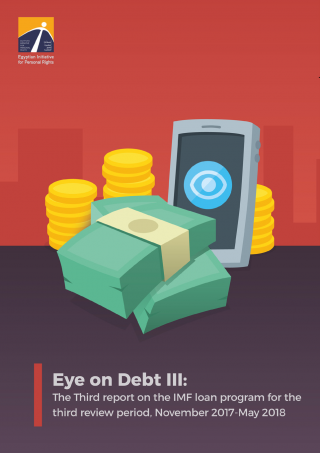On 18 November, the West Alexandria Court (Circuit 47- Workers) ruled to reject Appeal No.
Files: Anti-Corruption & Transparency
The Egyptian Initiative for Personal Rights (EIPR) issued a comment on the report released lately by the Investigatio
Coinciding with the International Day in Support of Victims of Torture, the undersigned independent human rights organizations condemn the Egyptian government’s systematic practice of torture against prisoners in the country.
This requirement constitutes an encroachment on the concepts of "energy poverty" and "energy justice", because it drains energy resources for the benefit of these factories at the expense of making them available to Egyptian families, especially the poorest. It also contradicts the Goal 7 of the Sustainable Development Goals 2030: "Clean energy at affordable prices", because it sells polluting energy to factories at lower prices than they are, thus impeding the shift towards clean energy.
EIPR stresses the importance of equitable distribution of vaccines among citizens, and commitment to full transparency in clarifying the basis on which the vaccine will be distributed, because justice and transparency are the way to gain citizens' confidence in responding to the state's directives during the vaccination process of the Covid-19 vaccine.
Egypt has missed that opportunity, so far, according to the paper published by EIPR, on October the 17th, titled: "Four flaws: Assessing the Egyptian-IMF energy subsidies reform". The publication coincides with the International Day for the Eradication of Poverty. The paper depends on the principle: "clean energy guaranteed to all at reasonable prices", which is the seventh goal of the sustainable development goals that the Egyptian state adopted and is supposed to achieve (Egypt 2030).
These drastic economic measures are taking place alongside a severe crackdown on civil and political rights. Egypt’s civic space has been decisively evaluated as “closed” by international monitoring initiatives, and the government has recently ratified an NGO law that UN human rights experts have indicated could “devastate civil society.”
The report assesses the economic and social impact of the economic adjustment program, agreed upon by the Egyptian government and the International Monetary Fund as a condition for Egypt’s receipt of $12-billion loan under the Extended Fund Facility, to be disbursed in six tranches.
The EIPR reiterates its reservations on most of the IMF loan terms, which have adverse socioeconomic impacts on most citizens and are damaging to the economy and social stability.
Egypt was hit with the biggest fine in its history when the ICSID ruled on September 3, 2018 that Egypt was liable for compensation of $2 billion to Union Fenosa, as damages for the 2014 government’s failure to provide gas to the company during the energy crisis in Egypt.





